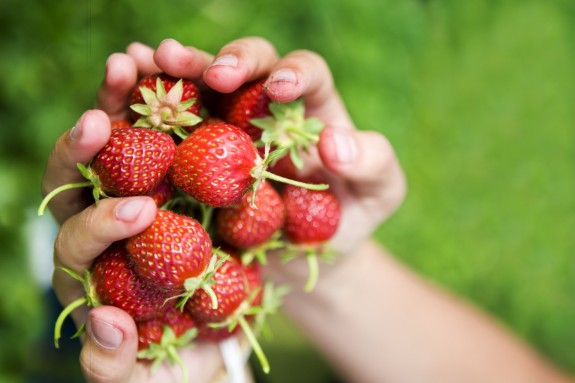Harvard Study: Fruit Reduces Diabetes Risk
- At March 19, 2012
- By Katherine
- In Articles, News
 0
0
-
- Swedish Strawberries (Photo: Swedish Embassy)
People are always asking me if fruit is too high in sugar to eat, especially if you have diabetes. This fear of fruit, I believe, is leftover from the Atkins craze, making foods like fruits, and even vegetables like carrots, verboten. This is one of the most tragic consequences of this diet fad, because avoiding fruit can actually damage your health.
People who eat fruit have a lower incidence of Type 2 Diabetes, the most common form of the disease, according to a recently published Harvard study. But this study isn’t alone in its conclusions. It corroborates decades of research showing the nutritional value and health benefits of fruits.
Fruit is high in water content and fiber, which help you feel full with fewer calories. Even though it contains simple sugars and carbohydrates, most fruits have a relatively low glycemic index, that is, when you eat it, your blood sugar raises only moderately, especially when compared with refined sugar or flour products.
Fruit is loaded with nutrients scientists believe protect people from major chronic diseases such as heart disease, cancer, type 2 diabetes, and more. The potassium in fruit helps lower blood pressure and actually helps neutralize the blood pressure-raising affects of sodium.
Eating more fruits and vegetables – as high as 5 cups per day or more – is a habit which could help you stabilize and even reverse Type 2 Diabetes. Yes, it is possible!
And, the best part of fruit? It’s delicious! It’s easy to eat, to pack in your lunch box for the office or school, and it’s such a refreshing snack or dessert. What could be better?
Dietary flavonoid intakes and risk of type 2 diabetes in US men and women
Nicole M Wedick, An Pan, Aedín Cassidy, Eric B Rimm, Laura Sampson, Bernard Rosner, Walter Willett, Frank B Hu, Qi Sun, and Rob M van Dam
From the Departments of Nutrition, Epidemiology, and Biostatistics, Harvard School of Public Health, Boston, MA; Channing Laboratory, Department of Medicine, Brigham and Women’s Hospital and Harvard Medical School, Boston, MA; the Department of Nutrition, Norwich Medical School, University of East Anglia, Norwich, United Kingdom; and the Departments of Epidemiology and Public Health and Medicine, Yong Loo Lin School of Medicine, National University of Singapore, Singapore.
Supported by NIH grant from the National Heart, Lung, and Blood Institute.
Abstract
Background: Data from mechanistic studies support a beneficial effect of specific flavonoids on insulin sensitivity. However, few studies have evaluated the relation between intakes of different flavonoid subclasses and type 2 diabetes.
Objective: The objective was to evaluate whether dietary intakes of major flavonoid subclasses (ie, flavonols, flavones, flavanones, flavan-3-ols, and anthocyanins) are associated with the risk of type 2 diabetes in US adults.
Design: We followed up a total of 70,359 women in the Nurses’ Health Study, 89,201 women in the NHS II, and 41,334 men in the Health Professionals Follow-Up Study who were free of diabetes, cardiovascular disease, and cancer at baseline.
Results: During 3,645,585 person-years of follow-up, we documented 12,611 incident cases of type 2 diabetes. Higher intakes of anthocyanins were significantly associated with a lower risk of type 2 diabetes after multivariate adjustment for age, BMI, and lifestyle and dietary factors. Consumption of anthocyanin-rich foods, particularly blueberries and apples/pears, was also associated with a lower risk of type 2 diabetes. No significant associations were found for total flavonoid intake or other flavonoid subclasses.
Conclusion: A higher consumption of anthocyanins and anthocyanin-rich fruit was associated with a lower risk of type 2 diabetes.
For more fabulous tips and simple, effective ways to lose weight,
buy her book, Diet Simple!










